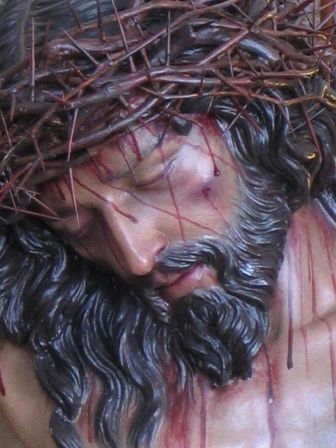
(40 minutes) – To listen to this audio, click on the triangle.
SOURCE: Lent 2019. Father Robert Elias Barcelos, OCD at Mount Saint Joseph’s Monastery, San Jose, California.

(40 minutes) – To listen to this audio, click on the triangle.
SOURCE: Lent 2019. Father Robert Elias Barcelos, OCD at Mount Saint Joseph’s Monastery, San Jose, California.

Luke 5:27-32: Jesus saw a tax collector named Levi sitting at the customs post.
He said to him, “Follow me.”
And leaving everything behind, he got up and followed him.
Then Levi gave a great banquet for him in his house,
and a large crowd of tax collectors
and others were at table with them.
The Pharisees and their scribes complained to his disciples, saying,
“Why do you eat and drink with tax collectors and sinners?”
Jesus said to them in reply,
“Those who are healthy do not need a physician, but the sick do.
I have not come to call the righteous to repentance but sinners.”
NOTE: Click on the triangle to listen to Father Robert’s conference.
What is our Lord saying to us about our observance of Lent in the scriptures? The scriptures of the Liturgy of the Mass give us guidance for spiritual growth; our call to penance, to conversion is a call to health.
Jesus says those who are healthy do not need a physician. The practice of Lent, in adopting for ourselves exercises of deeper prayer, of fasting, and works of mercy is for the sake of our own healing, the healing of humanity, with its disordered desires – to bring true health to the soul.
Whenever St. John of the Cross talks about purification in his spiritual teachings, for example in The Dark Night, he always talks about this purification, this refiner’s fire bringing about a new health in the soul, healing the soul. And the Divine Physician is our Blessed Lord in His divine love, who says, “Those who are healthy do not need a physician, but the sick do. I have not come to call the righteous to repentance but sinners.”
Those who are self-righteous never think that there is any sickness in them. The closer we draw to the light of God’s love in a genuine devotion of conversion of heart, the more we see what is unhealthy in us, what is in need of healing, the more we see the sickness that we are sinners.
We are an interesting mix. All of us as human beings are a mix of light and of darkness; we are a living contradiction. In the one sense, we are sinners but on the other hand, we also possess the seed of eternal life and of divine life through grace in Christ. We have both of these realities – a broken human condition and a potential to share in the divine nature.
Lent is a time for healing, for the aligning of our wills to what God wants of us. For this reason, the psalm says, ‘Teach me your ways, oh Lord” – not my way, and not the world’s way. Teach me your way of the best manner of life, the best way to live. Show me what it means to live the best life I can live. Show me how to become my best self and your way in bringing about your dream for my life. Teach me. I need to be taught. I need to learn from You.
It is the humble of heart, and not the self-righteous who can make this prayer to allow oneself to be coachable by the Lord of what it means to walk in His truth. If we are humble, we realize in one level, that in a sense, we all have to go back to the beginning, the genesis. We are all beginners, and we all have to go back to the fundamentals, the basics of what it means to be a believer and disciple of Jesus Christ.
We have to go back to the simple gospel of The Beatitudes. Teach me, Lord, how to live this. Teach me Lord how to understand this. Show me daily. Be my personal life coach from the moment I wake up until the moment I take my last breath, show me and teach me through everything.
The prophet Isaiah tells us that the Lord wants to teach us His way of mercy, par excellence. So many times in both the New Testament and the Hebrew scriptures, we hear Jesus say, ‘I desire mercy, not sacrifice.’ It’s not that sacrifices aren’t important, or that there’s no need anymore for asceticism, but the purpose of sacrifice is for the sake of learning mercy. This is the way, the will of the Lord, the manner in which we grow in wisdom – that we learn what it means to be merciful.
The scribes and the Pharisees were far from being merciful as the Lord is merciful. Their pride and self-glorification blinded them from God’s wisdom of mercy. It blinded them from the will of God. They were hyper-religious, but their religiosity was something of their own performance and their own ego. Christ calls us to be converted from that tendency.
To be true disciples of Christ is to be true friends of the Lord and this means the way of mercy. When we begin to walk this way of mercy through humility, Jesus promises that we can become like a watered garden; we can become a spring with the holy spirit. Jesus promised that fulfillment. ‘Whoever believes in me, from their hearts shall flow waters of living waters, bursting forth into eternal life.’ You won’t be able to contain it and hopefully it will just come out in praise and jubilation, glorifying God.
We can’t always live at such a peak experience at every moment of our day, but there should come some moments when the presence of the Holy Spirit takes on a high pitch and becomes piping hot – to be zealous for the Lord and on fire for God.
We embrace the purification, that we may be transformed into fire, the living flame of love, where we may delight in the Lord as he leads us into his heights.
Lent is a desert journey; like the climbing of a mountain, we’re called to ascend to the heights of a new communion with Jesus Christ, the most high who became the most low in His humility. The most high, transcendent God emptied himself and became the most low. The only thing God competes with us for is the lowest position. He is always competing for the last seat – not because he wants to sit at the back of the church – but because he’s the most humble slave.
SOURCE: Lent 2019 Homily, Mount Saint Joseph Monastery, San Jose, Califormia
1 Cor: 15:54-58
Brothers and sisters:
When this which is corruptible clothes itself with incorruptibility
and this which is mortal clothes itself with immortality,
then the word that is written shall come about:
Death is swallowed up in victory.
Where, O death, is your victory?
Where, O death, is your sting?
The sting of death is sin,
and the power of sin is the law.
But thanks be to God who gives us the victory
through our Lord Jesus Christ.
Therefore, my beloved brothers and sisters,
be firm, steadfast, always fully devoted to the work of the Lord,
knowing that in the Lord your labor is not in vain.
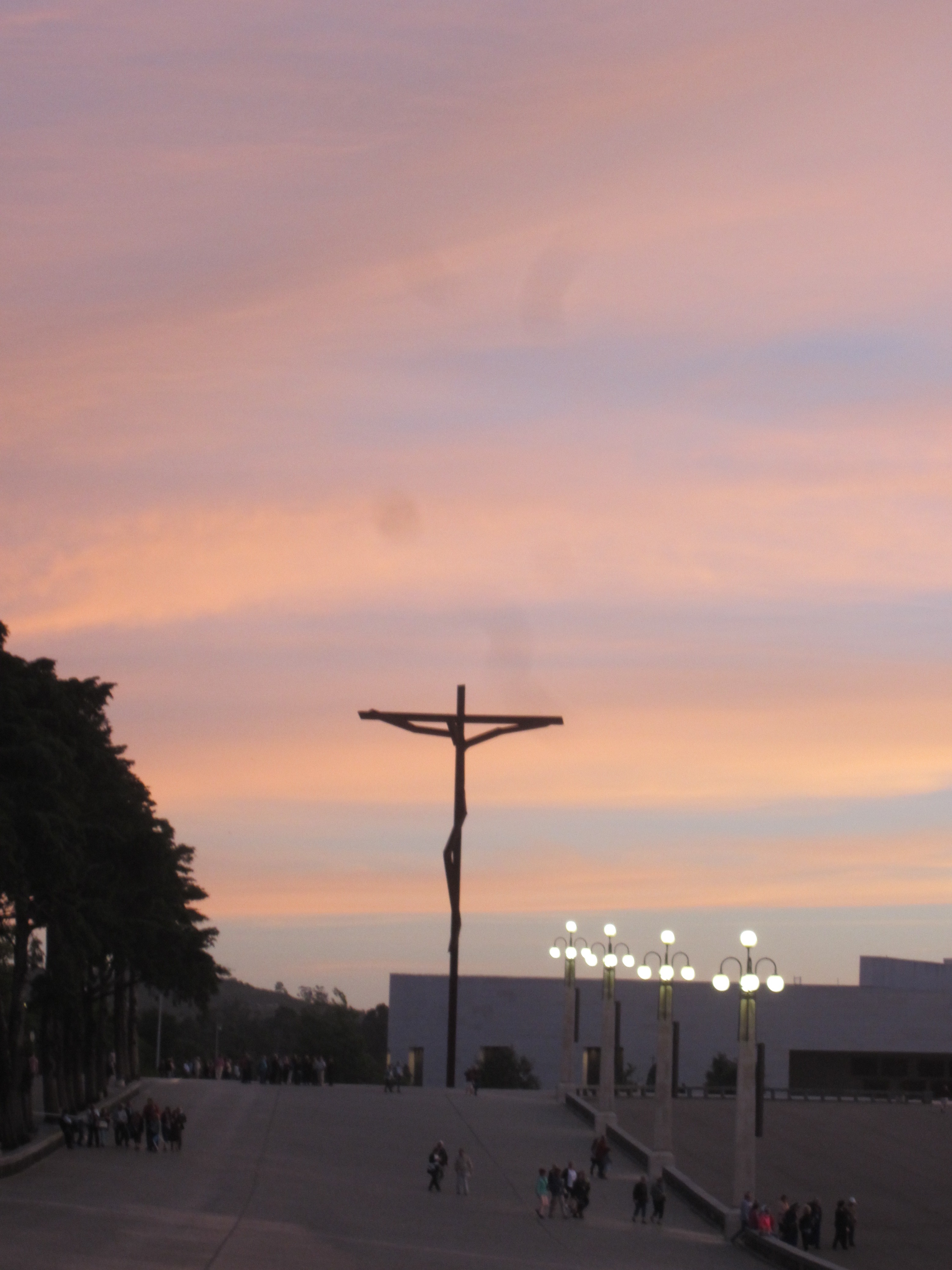
Saints John of the Cross and Saint Teresa loved the Gospel of John as the most contemplative gospel and as one written by a friend of the Lord who contemplated His life, and the mysteries he had experienced in his encounter with Christ.
St. John the evangelist is symbolically represented as the eagle, the bird that flies the highest and a most majestic creature. Eagles soar at the highest altitudes and can see the furthest. This is symbolic of St. John’s soul as the beloved, the divine, the theologian. He is not just someone who is smart, but someone who has a heart knowledge of God and has been enlightened to penetrate the understanding of God as God.
This knowledge comes, not just through intellectual reasoning, but through a deep love which prepares the way to revelation, and opens the gates for God’s glory to come upon us so that we can come to know God through the depths of our hearts.
This divine intimacy is true theology – St. John is a true spiritual master in his relationship with God through a life of hope, faith, and love.
In Luke Chapter 6, one of the themes was that no disciple is greater than the master. [“No disciple is superior to the teacher; but when fully trained, every disciple will be like his teacher”] (Luke 6: 40).
In this gospel, we see an iconography, as we see in the iconographies in the Eastern Churches, where it is difficult to distinguish Jesus from the apostles among the written images. Why? This shows that true friends of God begin to look like the Master and to radiate the Master because God has been en-fleshed in their lives.
St. Symeon the New Theologian [949-1022 AD] was a mystic of fire and light, of the Divine Word. The eternal Word of God became flesh through the ‘Yes’ of Mary and was incarnate in Jesus of Nazareth. St. Symeon points out that though the whole of creation and the world came into being through Christ, the Holy Spirit did not take on a humanity as Jesus did. However, the Holy Spirit’s manifestation becomes flesh, is incarnate, in the lives of the saints, who are the hypostasis [the fundamental reality and substance] of the Holy Spirit.
This is the mystical life of grace that St. John and St. Teresa talks about, which is best reflected in the Gospel of John. [In the beginning was the Word, and the Word was with God, and the Word was God. He was in the beginning with God. All things came to be through Him, and without Him nothing came to be] (John 1:1-3).
In John 14-17, Jesus gives his Farewell Discourse to his disciples and tells them, “Do not let your hearts be troubled. You have faith in God; have faith also in me” (John 14:1) and “I am the way and the truth and the life. No one comes to the Father except through me” (John 14:6).
Jesus is preparing his disciples for His departure and is building their spirits before they are to face seeing their Savior being crucified – in order to root them to be stable amidst the storm on the way. This final discourse is given in the context of The Last Supper.
Just before this, Jesus gives his Bread of Life Discourse, when He says, “I am the bread of life; whoever comes to me will never hunger, and whoever believes in me will never thirst” (John 6: 35). Thus, the anchor of hope and strength for perseverance is found in the Eucharist and the Sacrament of Holy Communion.
John’s understanding of who Christ is has to be balanced with our experience of the cross in our lives, and the wisdom and power of God working through that cross. St. Paul boasts in the cross of Christ in Galatians 6:14 when he says, “Far be it from me to glory except in the cross of our Lord Jesus Christ.” He again exclaims that the cross is the wisdom and power of God in First Corinthians, Chapter 1.
Archbishop Sheen has said that before we can have wine and bread at our altar, it had to first be found in the fields of grapes and wheat, which start off as seeds until they mature to bring about a new kind of life. The wheat and the grapes must then be crushed and destroyed before they can become bread and wine. These external forms, regardless of a priests holiness or not, becomes Jesus present in the Sacrament – body, blood, soul, and divinity – in the Sacrament of the Holy Eucharist.
In the same way, interiorly we will feel crushed. But out of that, God brings transformation, something better than before. From death emerges new life, just as the grapes and wheat takes a new life, the life of Christ.
Death to self leads to conversion; in the midst of death is hidden a victory and that victory is that the kingdom of heaven is at hand and I couldn’t have accomplished this victory on my own. Only God could’ve done it, using external instruments to bring about the chiseling of a masterpiece from the marble. Only He can make a masterpiece out of the mess.
Life will emerge from the cross. We need to face this truth head-on and we will have to face the cross. Yet the cross is God’s instrument for metamorphosis, where the soul can become divine, and our humanity becomes united to Christ in the Holy Spirit. In today’s second reading in First Corinthians, Saint Paul says, ‘Oh death, where is your sting? O death where is your victory?’ This miracle of life despite death cannot happen without the cross.
The truth of the cross passes the test of time and experience. I have found tremendous consolation in this truth, which has helped me in the deserts and steep mountains that I have had to cross and climb. With each new difficulty, I remind myself of these truths and am able to draw vitality – like an umbilical cord, my source of life – from the heart of God, to be able to pick up my cross, knowing that Jesus makes all things new — and I am able to keep going.
There’s a lot of power when we profess the truth of God in our lives because the enemy will try to provoke fear and frustrations subtly to master our emotions. Once we realize that ‘I’m being worked on here by the enemy’ and that ‘He is attacking my woundedness to keep me stuck,’ once I realize this, I have to make a choice.
Stand on the rock foundation to squash the lies and renounce them in Jesus’s name, professing Christ’s truths – ‘I am with you always’ …‘Peace be with you’ – the words of Christ come from the Word made flesh, and His words are our inheritance
When you do this, something deep inside of you that wasn’t there before will grow and erupt because you made an act of faith. Truth is what strengthens faith – not feelings. That act of faith allows Jesus to manifest.
Only God can tell us who we are, and it is our prayer that throws light on previously unexamined parts of our souls. All falsehood becomes more apparent as we ground ourselves in the truth.
Sometimes, when we have been given enough tools of faith to face a challenge, it feels like we are alone to fend for ourselves, especially in the beginning, during the Purgative Way, and much later in our spiritual journey, during the Dark Night of the Spirit. In these times, we are aware only of our own capacity to sin, the rawness of our fallen condition, and how broken our humanity is.
This darkness exposes the roots of our condition for healing by the Divine Physician. He is healing us at our core – as we will the good despite what we feel, freeing us from attachments, all aspects of our false selves, our idols, and the chains that we weren’t even aware we relied on – all through prayer.
Contemplation is openness to God’s love, even though His ways come in ways that feel dark and we experience loneliness. Yet His transforming love is working.
John’s gospel and his other writings don’t wallow in suffering –they are victorious. Night is a truer guide than the day. God works His greatest miracles because of the cross and not through the periods of consolation.
The flame that once burned and cauterized will one day bring healing. Carmel testifies that God’s love is always present in the debris of life, and only faith can give us the eyes to see this.
SOURCE: March 2019, Secular Discalced Carmelite community meeting, Santa Clara, CA
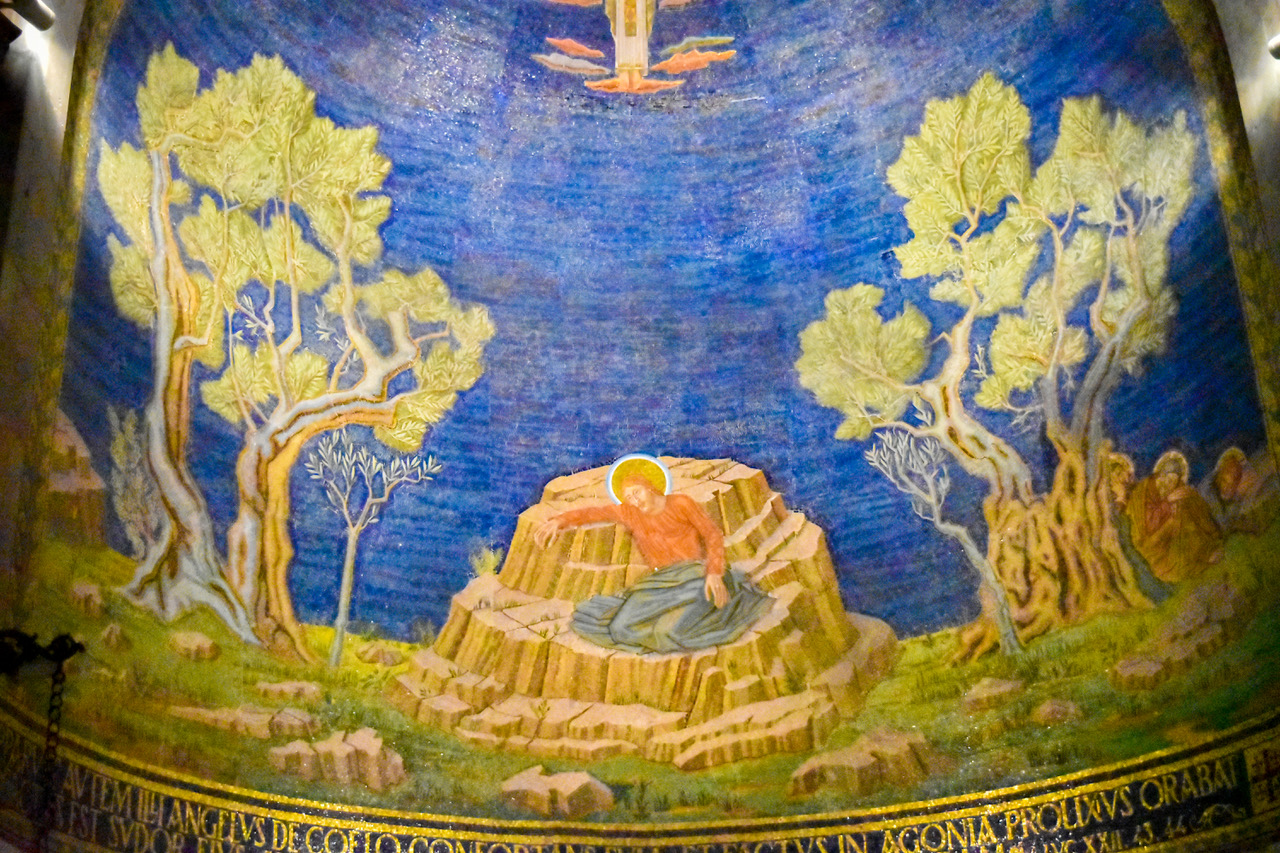
Luke 19: 41-44. The Lament for Jerusalem.41 As he drew near, he saw the city and wept over it, 42saying, “If this day you only knew what makes for peace—but now it is hidden from your eyes. 43 For the days are coming upon you when your enemies will raise a palisade against you; they will encircle you and hem you in on all sides. 44They will smash you to the ground and your children within you, and they will not leave one stone upon another within you because you did not recognize the time of your visitation.”
If you notice this chapel is in honor of dominus flevit, the Latin for ‘The Lord Wept.’ Who wept – the Lord, referring to the sacred name of God revealed in Sinai – the eternal one who has no origin or end, who is the beginning, the middle and the finality of all things.
This is the Lord who wept. This is Jesus of Nazareth.
This chapel is in the shape of an upside-down tear, like the tear that came down from Christ’s face. All the shapes of the ceiling, the arches, the windows, is reminiscent of tears falling down from Jesus’s Holy face. And above on the pillars on the four corners on the ceiling are vases. I interpret that to mean, the collection of our Lord’s tears, just as the angels, would have spiritually collected every drop of His precious blood that came from his sacred humanity during His Passion, so too must the angels have spiritually collected the tears that came from the Holy Face of the incarnate Word of God.
But also, our guardian angels, each collect the tears that we have shed in our pilgrimage of our spiritual life journey, and we know that is not an easy path. The way of the cross is never easy. To follow our Good Shepherd means that we will inevitably have to follow Him in valleys of darkness in order to find new pastures of renewed life in the Lord.
We too will inevitably have to shed tears, whether it’s like Jesus at the tomb of Lazarus, tears that come spontaneously from the times in which we lose a loved one, as Jesus so loved Lazarus; or also like the tears that he shed here – where He suffered tears of rejection and His love was misunderstood. The miscommunication of love, where His love was not accepted, was a source of sorrow for Him.
Anything can make some people cry – a good movie, an emotional experience. Some people can cry very easily. But the tears that come from a movement of the Spirit, whether it’s contrition or compunction, a true sense of sorrow for our sins that doesn’t come from a false guilt, which usually happens because of damaged emotions, a malformed conscience – that’s not the kind of contrition I am talking about.
True repentance is a gift of the Holy Spirit that we call metanoia – a conversion of life. To have the gift of tears that comes from a metanoia experience or a catharsis experience, is to have cleansing, saving tears. That is living water – that’s a gift of the Holy Spirit. To have the gift of tears in this respect is an anointing from heaven that shows salvation is happening in the soul. A baptism is happening in the soul of that person that is coming out in tears. That is a grace of God.
I don’t have that gift. Saint Teresa had the gift of tears. Many monks in the Eastern Church talk about the gift of tears as an expression of metanoia. That’s a wonderful gift. I wish I had it, but I don’t. This gift brings about a new birth; it’s the water of a new birth taking place in the soul, a deeper conversion, a deeper communion with God as a result of our hearts being, as it were, crushed in order to be resurrected.
One thing from the first reading from Isaiah to point out – when our Lord prayed here, He says, ‘Would that you knew what would avail you for peace. I came to bring you peace but you have rejected it.’ As a result you will be the ones to suffer. You will be inviting more problems into your life. I came, not to free you from your problems but to be a medicine to give you the strength to overcome them.
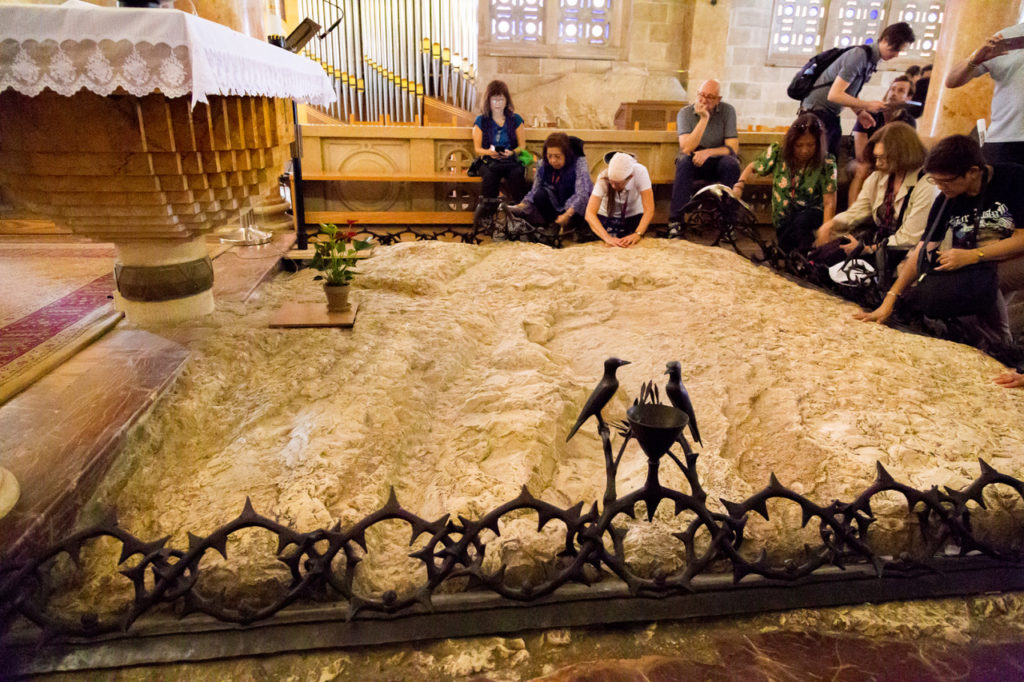
In other words, in Hebrews, Jesus’s presence of salvation doesn’t mean that we will be immune to problems. When Jesus says ‘Follow me,’ He doesn’t say, ‘Follow me and all your problems will go away. You will never experience any suffering.’ That is not His promise. His promise is, ‘I will be with you always; no matter what you go through, it will grow you.’
He will bring all things into subjection into Himself. If He allows it, He can redeem it. He will bring good out of it. He will bring that poison in your life, and turn it into medicine. He will use it for your healing; the very thing that most afflicted you, and that was the greatest cause of your tears, he will use as a cause of your transformation.
This is the promise of salvation. Redemption. Bringing good out of evil. But there’s a time of visitation, he says, a specific time in which He allows the grace to be available to us, and he calls us to not be afraid to enter into that; to not postpone the moment of grace; to not wait until tomorrow; today, to take advantage to receive the grace and His Spirit; today, I ask; today, I allow you to work in my soul.
The prophet Isaiah says, ‘Let my eyes stream with tears over the destruction that overwhelms over the incurable wound of my people.’ He continues, ‘We waited for healing but terror came instead. Why have you struck as a blow that cannot be healed? For your name’s sake spurn us not, remember your covenant with us and break it not. Disgrace not the throne of your glory.’ Isaiah expresses the plea of God’s people in moments that seem insurmountable.
Have you ever found yourself in a situation when the problem seemed so big, that it seemed unresolvable? Of course you have; we all have. We think, ‘There’s no way I’m going to get out of this one; there’s no way I‘ll be able overcome this; there’s no way that God can bring good out of this one; it all ends here.’ These tears are seeds of salvation to bring forth a new harvest of grace in our hearts of God’s presence
This is an expression of the sympathy of God in being able to know our tears, and his angels collect them in a vase as sacred jewels. There is a time of our visitation. The remedy doesn’t happen immediately, but it does happen! It doesn’t happen according to our schedule, our time frame, our expectations, our impatience, or our itinerary. But it does come.
We often have an itinerary of what we propose, but God is the one who disposes. Man proposes, God disposes. In our itinerary of our pilgrimage of life, ‘I propose, God disposes.’
And what God has planned is always better than what we do. And every penance, and every inconvenience along the way, is only part of the greater construction of the final action, the final communion, the final effect of His grace in giving us what we came to look for – God’s face. We see the brightness of this beautiful face after having experienced some kind of brokenness. Passing through the brokenness we come to a new place in what it means to see God’s face.
Every tear is a seed for a harvest. Blessed be God who transforms our crying into dancing, and our mourning into a new anointing. Alleluia.
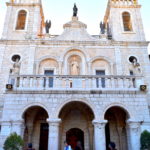
JOHN 2:1-11 – There was a wedding at Cana in Galilee, and the mother of Jesus was there. Jesus and his disciples were also invited to the wedding. When the wine ran short, the mother of Jesus said to him, “They have no wine.”
And Jesus said to her, “Woman, how does your concern affect me? My hour has not yet come.” His mother said to the servers, “Do whatever he tells you.”
Now there were six stone water jars there for Jewish ceremonial washings, each holding twenty to thirty gallons. Jesus told them, “Fill the jars with water.” So they filled them to the brim. Then he told them, “Draw some out now and take it to the headwaiter.” So they took it.
And when the headwaiter tasted the water that had become wine, without knowing where it came from — although the servers who had drawn the water knew —, the headwaiter called the bridegroom and said to him, “Everyone serves good wine first, and then when people have drunk freely, an inferior one; but you have kept the good wine until now.”
Jesus did this as the beginning of His signs at Cana in Galilee and so revealed His glory, and His disciples began to believe in Him.
There’s a lot in this scripture to capture the significance of this vocation of marriage. In God’s providence, He chose to manifest His Divine identity in the context of a wedding. In the Old Testament, God refers to His covenant with His chosen people as a spousal relationship. Isaiah refers to our God and our maker, as the Bridegroom.
God has a love for His people as a husband has a love for His wife. And Jesus came to bring about this mystical marriage between our humanity and God.

This Mass is going to be for the couples who are here present, number one. Two, for those of you who are married but your spouse isn’t present, I invite you also to renew your covenant with your spouse who is back at home. And as the couples here renew their vows, hold your hand with your wedding ring and renew your vows with your spouse. Invite the Lord to bring healing into your relationship, if there is need of emotional healing, forgiveness, reconciliation, or of resurrection in your relationship with your spouse.
The third intention is for those who are widowed; pray for the eternal rest of your spouse that they may rest in the peace of God. The fourth intention is for those who are divorced. Love your enemies and your persecutors, whether they’re remarried or not. Some divorces are really traumatic and hard, so pray for healing. In some divorces, you just divorce as friends and you go your separate ways, and you have a friendship for the sake of the children. Pray for your ex-spouse, but pray especially for your children because they experience the effects of the divorce differently than you do.
And fifth, for those who are single and are still open to the possibility of marriage: if that is God’s divine will for you, pray that God will bring the right person in your life, the person that He knows will be the best for His plan for your happiness. For those who are called to the single life, and didn’t want to have a single life, who wanted to be married but never found the right person –pray for the peace of acceptance because God’s vocation of love is ever alive in your life.
Pray for the acceptance in your life, knowing that you are not any less lovable in God’s eyes. You’re not in any way less than those who are called to marriage. Pray for that acceptance in discovering God’s vocation of love for you because God needs you to flourish in the gift of love that you have to offer, whatever it may be.
Pray for the acceptance that ‘Yes, God has chosen me for a vocation of love and it doesn’t mean that I am any less qualified for marriage than anyone else, but that God needs me where I am, and where I’ve been planted.’ Pray for the acceptance to grieve for the fact that ‘I may not have been able to be married and be a parent.’ Grieve this gift of experience that you may be free to live the gift of where you are called to now.
As we celebrate the Eucharist, and as these couples renew their covenant, let us renew our covenant, first and foremost, to God because He is the love of all loves and the only love of our lives that is important.
Those who are married know that to love is a battle. Sometimes, those who are married wish they weren’t married, and those who aren’t married wish that they were. We’re always admiring the ones on the other side. We hear from the scripture that love is a battle. It’s not easy and we need God’s grace.
And ultimately it’s God’s love that is the only love that does not disappoint. As human beings, we are so flawed and broken that we make mistakes. Inevitably, we will let down those who rely upon us. There is no perfect person and we have to learn to be comfortable with the imperfect, to accept the weakness and to find grace in the midst of it.
It is with faith that we celebrate love, especially the love of God who is the center of all of our lives.
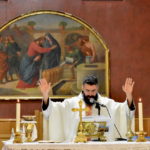
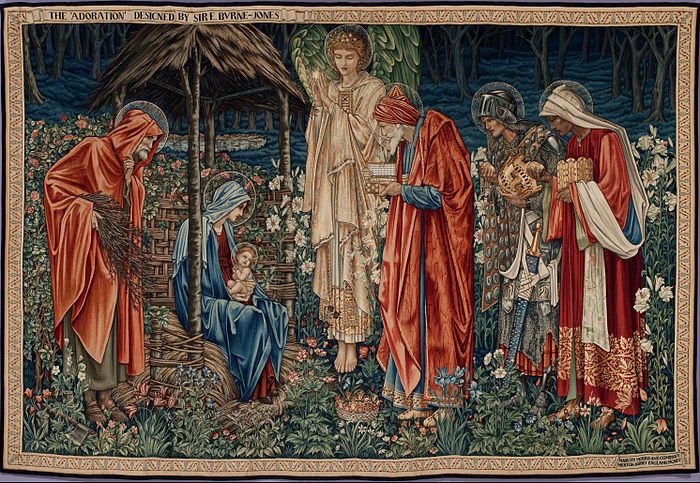
The Mystery of Faith is said after the consecration, after the words of Christ during the Last Supper: ‘For this is the Chalice of My Blood, of the new and eternal Covenant: the Mystery of faith: which shall be shed for you and for many unto the remission of sins. As often as ye shall do these things, ye shall do them in remembrance of me.’
The Mysterium Fidei is said during the Eucharist because the mystery of who God is — is most communicated in Jesus Christ as the sacrament of God. He is made flesh through the Eucharist, which most perfectly provides, and makes available His gifts for us. Every epiphany is an epiphany of a manifestation of God.
According to Saint Paul the mystery has been revealed to us in God’s divine nature, and He has shared this mystery with us through faith.
We cannot fully grasp the significance of ‘God made man.’ It takes an epiphany to recognize that God was like me – human and suffering. He assumed poverty in order to elevate me. As cradle Catholics we need an epiphany to discover the greatness of that truth.
On this Feast of the Epiphany, this is my challenge for you – that you be awakened by the Holy Spirit to know the story of your soul. Recall the wonders of God’s presence in your life.
What were the stars that brought you here? Where did you encounter God? Nature, a crisis, family relationships, trauma, unemployment – all of these and every circumstance could have been instruments in your life to reveal the Star of Bethlehem. Jesus came to show us how to find His light amidst the darkness and irreparable brokenness.
Some wounds are beyond remedy because a person is not open to God’s healing; faith is stuck in a box, and God’s healing can only do so much in these situations.
The recognition of God’s revelation is a supernatural gift. It is not usually seen with our eyes, but something we experience in our heart of hearts. And to see this light, we need to be obedient.
We know very little about the Three Kings who visited Jesus. At some point, they recognized a stirring from God to seek something greater than themselves. This desire sparked a new seeking, which led to a new finding of a treasure of wisdom better than they had ever known.
The lives of the Wise Men is the message. They had no idea what they would find for God’s presence is amidst the unexpected. Yet they were obedient to each inspiration – the small tasks. When the Magi found the King of Kings, they found Him in total poverty. God’s wisdom is manifest to us in the most unexpected people, places, and circumstances – far from ideal – but God is waiting for you there.
God stirs us in our souls. We experience the clarity of God’s call by faith, and not by certainty – even when we don’t feel His presence, and only have an assurance. Only after having gone through our experiences of darkness are we able to look back and understand. And this epiphany and understanding usually comes through an encounter.
If you don’t know why you’re doing something, but you know that you are being obedient to that small inspiration, you will find His presence, despite the discomfort or awkwardness you may experience – through an unexpected event or person.
This epiphany brings about conversion, a new birth of understanding of who I am and who He is.
Whatever your work or home situation, no matter how far from perfect it is, that is the very context that God uses to bring light and holiness. Your life is the best context to sanctify you, though it may seem imperfect to you. The people who are most difficult for you are the very people He has chosen to challenge your self-love to purify and refine you.
That is wisdom – to allow our perception to be changed and to keep our eyes on the star.
What gives us strength in faith? – Scripture and the Eucharist.Throughout the story of your soul, God has used scripture passages to speak to you in different stages of your life. And in the Blessed Sacrament, we find an anchor of refuge, hope, and assurance of God’s will for ourselves. We renew our attitude and determination. God has also placed certain saints in your lives to walk with you — an image or picture of that saint can inspire a deep and holy longing in you.
At the end of their pilgrimage to Beauty, the Three Wise men prostrated themselves and offered the Christ Child gold for His kingship, frankincense for His deity, and myrrh for His death.During this Epiphany, we are called to offer all our gifts and treasures so that we may discover who we are before God, that we may be enlightened in our understanding of His work in us.
The treasure of your crosses, the people in your life – give all that you are to Him so that He can give Himself to you in exchange. And He will always give more in return, for the more a person must suffer, the more that person will receive.
Know the story of your soul and seek your Star of Bethlehem.
NOTE: I have added as a permanent side link, The Daily Examen, adapted by the Carmelite Sisters of the Most Sacred Heart of Los Angeles, to help you daily seek your Star of Bethlehem. – TL
Click on this Facebook link (belonging to Lorelei Low, ocds) to have a glimpse of the Jerusalem Pilgrimage 2018 with Father Robert Elias
A reading from the Holy Gospel according to John
In the beginning was the Word,and the Word was with God, and the Word was God. 2 He was in the beginning with God.3 All things came to be through him, and without him nothing came to be.What came to be 4through him was life, and this life was the light of the human race;the light shines in the darkness,and the darkness has not overcome it.6 A man named John was sent from God. 7 He came for testimony,to testify to the light, so that all might believe through him.f 8He was not the light, but came to testify to the light. 9 The true light, which enlightens everyone, was coming into the world.10He was in the world,and the world came to be through him, but the world did not know him. 11He came to what was his own, but his own people did not accept him. 12 But to those who did accept him he gave power to become children of God, to those who believe in his name, 13 who were born not by natural generation nor by human choice nor by a man’s decision but of God.
14And the Word became flesh and made his dwelling among us,and we saw his glory,the glory as of the Father’s only Son,full of grace and truth. 15 John testified to him and cried out, saying, “This was he of whom I said,l ‘The one who is coming after me ranks ahead of me because he existed before me.’” 16From his fullness we have all received, grace in place of grace,* 17because while the law was given through Moses, grace and truth came through Jesus Christ.m 18No one has ever seen God. The only Son, God,who is at the Father’s side, has revealed him.
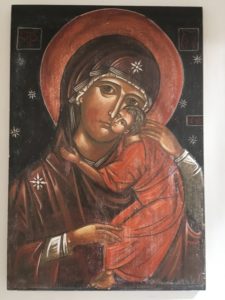
Merry Christmas everybody!
Jesus wants to provide something new for us, an unprecedented experience of Christmas through the present of His presence. That is what Christmas is all about.
And in Christ, we can be open to experience the beauty of life. We are meant to discover each of our lives as gift. In fact, the most important gift that you can give, more than anything you can buy –is yourself.
When we give the gift of our life, we begin to experience a new birth of love, which is what God desires for us to dawn within ourselves, the rebirth of knowing your worth to the beauty of God’s love for you. This is the glory of Christmas.
To discover all of life, beginning with your own life story is a gift. The good times and the bad – all have purpose and value. The Author of life knows the story of your soul better than you do, and He more than anyone else is able to speak to that secret part of our hearts that you may not be able to communicate, even to the people you love most. God alone can reach into the area, of who we really are and He wants to reveal to you how much you are worth to Him.
He was born for you.
God is the light, the love, and the logic that is at the heart of all life, the artist who designed all that exists; he is poet who spoke into being all beauty and meaning and He was born for me, for you.
We have to personalize Christmas, not just as something of the past, but as something personal and of the present. Jesus was born for me, as if I were the only person he wanted to be born for because he wants to be born in my life. He wants my heart to come to a new birth.
This rebirth is a matter of knowing our own worth, but our true value and self-worth cannot be found from the outside world. What we do for a living, what we own, or what we look like – these are not the basis and foundation of the worth of our lives. Our importance can be found in more than what we buy from the department store, how much money we make, or the expensiveness of our gifts. Our true value and self worth must not be found in our accomplishment, our social status, or how we dress.
Our worth is found from the inside.
Each of us possesses in the secret recesses of our hearts a greatness beyond which there can be nothing greater; we all have that inside of us. And faith is the vital link that connects us to the supreme good that is inside of us – God.
God does not want to be elusive or distant from our human experience. In Christmas, God wants us to know the wondrous newness of His presence in our midst, mysteriously at work in each of us. God with us – Immanuel. He loves us above and beyond our shortcomings and failures, and beyond our own sins and brokenness.
When God’s Word comes to birth in us, our world is no longer the same. When the Holy Spirit brings us to new birth and awakes us to the fact that Christ was born for me; when that truth comes to birth in our heart; when knowing Jesus comes from the head to the inside of who I am, then we can be awakened to a sense of wonder to what Christmas is about.
We will awaken to the radical awareness of God’s grace and the new horizons of beauty in what our hearts are made for. This Christmas, we are called to be open to God’s gift to us, the present of His Presence, which He wants us to receive and personally experience.
In His Son, God is a free gift of love – second to none. He wants us to receive what Jesus possesses in Himself – love’s pure light, beyond which nothing can be greater. God alone can help us savor this love’s pure light, which already lives in us and He desires to grow in us.
Jesus’s birth as our savior reminds us that He came to free us from slavery, the slavery of our tendency to glorify ourselves more than the Almighty. He came to set me free from anything that tries to suppress my true self. The Creator became incarnate to set me free from living a life other than the one I was created for and set into the world for; to set me free from anything that is unworthy of my dignity as a human being created in His beauty – from negativity and everything unworthy of my destiny to share in God’s eternity.
The harmony, the goodness and glory that is the source, the summit and the center of the universe today is sent into the world to reveal in our lives God’s Word, who seeks to be made flesh again, to come alive in our lives in a way that is fresh and relevant to each of us.
Christmas is about the gift of life continuously being given, and experiencing a new birth of what it means to love. This birth of our self-worth that Christmas represents by the birth of Jesus expresses our common cry to arise from being a mess to becoming a masterpiece; from agony to glory, from depression to passion, from pain to purpose; for it is better the pain than to remain the same.
And the context of this metamorphosis is the raw realities of our human existence, the physical, psychological, social, moral and emotional dimensions of life. Life in all its beauty and brokenness abiding as one. Our hearts, scars, and resilience, fragility, and fervor are our unifying experiences.
The compassion of Christ has the power to transform poison into medicine and wounds into wellsprings of healing; for in love’s army, only the wounded can heal. In the words of Gandhi, our struggles develop our strengths. When we go through hardships and decide not to surrender, that is the strength of love, and where there is love, there is life and light.
St. Francis of Assissi said that all the darkness of the world cannot extinguish the light of a single candle so I can do more good if I ignite a candle than curse the darkness and scandal. That candle can give pleasure to a single person by a single act of love, one step, one smile, one day at a time.
We are to shine right here and now, where we are, in the sphere of influence we have been strategically placed, suited and destined to sow and to reap, to plant the seeds of peace, and to enjoy the fruits of freedom.
What is more important is not so much our work, but the love that it is done. What matters is not what we have, but who we become and who we are for others. Our greatness lies not in remaking the world, as in remaking ourselves. And the fact is we can’t remake ourselves by ourselves. We need someone greater than ourselves. That is why Jesus came to the world as a child – that we may no longer be the same.
May we be remade with Him, in Him, and through Him in what it means to love like Him. As we celebrate Christmas, may we be open to God’s presence working in us, speaking to us, breathing with us, and above all, loving in us.
Merry Christmas. May you be the reason someone experiences love this season. God bless you.
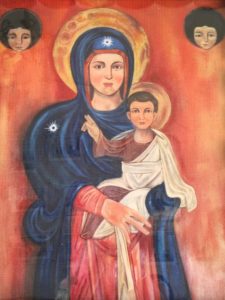
Stir up your power, we pray oh Lord and come to set us free by the fire of Your Spirit. Come by the fire of the spirit You sent deep within us, Lord Jesus. You came,You were born in the world to set us free from every form of enslavement, by the grace of your compassion from on high that we may possess true freedom.
Lord, Advent is a special time that you’ve given us to prepare for Christmas. The very name, the very word – Advent – means ‘come,’ – inviting You to come into our hearts; inviting You to be born again into the world in the Bethlehem of our inmost being.
And when You were born in Bethlehem, You chose not the perfect palace but You chose unexpected poverty. You wanted to be born in the most unexpected conditions – dire poverty. What to Mary and to Joseph must have seemed like a total inconvenience, what must have seemed like an entire setback, as if God the Father had sent them on this course and left them hanging – that setback was actually a set-up for a new way in which You wanted them to be blessed.
It was a set-up for those shepherds, for the poor people to come from the pastures; to come after hearing the message of the Angels; to give glory to God on high.
It was a set-up for those three wise men who came from far distant countries, having been kings of their own respective lands. They possessed everything the world ccould offer but they recognized that there was still something essentially missing. It was empty and they were inspired to seek a star that would lead them to the King of the cosmos, the sovereign Lord who would become an innocent infant.
You who are the infinite God became a vulnerable infant, Lord. As St. Therese says, you became a child, you became so small, so tiny, so helpless in order for us to not be afraid to approach you. Because there is nothing that can most attract our affection,that can most inspire tenderness than the beauty of a newborn infant.
You became that infant, Lord, that we may not be afraid to approach You as the eternal God; that we may not be afraid to take you into our arms, into our hands, into our lives and hearts. And You were born in the world Lord, in order to give Your life for us. You were born and placed in the wood of the crib in order to give Your life for us on of the wood of the cross.
You who are the sovereign Lord became a little baby, a little lamb and you voluntarily allowed yourself to be slaughtered, that every evil thing in our life may be slain and that we may have victory over anything and everything that could possibly try to steal our purpose for happiness.
You came to heal our wounds, to heal the brokenhearted. Your heart was moved with pity as You saw your people troubled and abandoned, and You gave your own followers, Your disciples power and authority over unclean spirits to drive them out and to cure every disease and every illness.
We present ourselves to Your love, Your heart, in the Blessed Sacrament in which is invisibly present, the grace of Your cross, Your life-giving cross; in which is present the radiance of your resurrection. Your divine mercy Jesus is present to us as the heart of who You are, the core of the gospel, the essence of Your message and mission, the power of God’s transforming love that is stronger than anything that can possibly ever harm us.
In the Eucharist, You are with us, as You promised You would be to the end. In the Eucharist, we can cling – as to an anchor- to Your victory over every evil. Your victory helps us to have the courage and strength to become the best version of ourselves; to not be afraid of conversion; to not be afraid to allow You to crush in us what whatever wall is getting in your way; to crush in us whatever hardheartedness is keeping You out; to crush in us whatever mountains of pride we’ve set up for ourselves in our false securities; and to raise up and exalt our valleys.
Lord Jesus, Your mercy is a medicine of immortality, an oasis of grace that heals our hearts’ deepest needs, a source of peace that overcomes the chaos, and a wellspring of serenity that gives birth to new life. We submit to your righteousness Jesus, to Your mission, to the riches of your grace and love.
Homily at the Shrine of the Beheading of Saint John the Baptist – Madaba, Jordan
(Click on the triangle on the left to listen to the audio. Below is a loose transcription of the homily).
Ambition of James and John. (Mark 10: 35-45)
35 Then James and John, the sons of Zebedee, came to him and said to him, “Teacher, we want you to do for us whatever we ask of you.” 36He replied, “What do you wish [me] to do for you?” 37They answered him, “Grant that in your glory we may sit one at your right and the other at your left.” 38 Jesus said to them, “You do not know what you are asking. Can you drink the cup that I drink or be baptized with the baptism with which I am baptized?” 39They said to him, “We can.” Jesus said to them, “The cup that I drink, you will drink, and with the baptism with which I am baptized, you will be baptized; 40but to sit at my right or at my left is not mine to give but is for those for whom it has been prepared.” 41When the ten heard this, they became indignant at James and John. 42 Jesus summoned them and said to them,“You know that those who are recognized as rulers over the Gentiles lord it over them, and their great ones make their authority over them felt. 43But it shall not be so among you. Rather, whoever wishes to be great among you will be your servant; 44whoever wishes to be first among you will be the slave of all. 45For the Son of Man did not come to be served but to serve and to give his life as a ransom for many.”
In the video we watched in the bus on the way here, I was pretty impressed by the King Abdullah II of Jordan. He was so down to earth and so in touch with his people, in regards to his authentic ways of living with passion, in his heart, and being very, very conscientious of the people whom he serves in a wholesome way. Seeing him dressed in civilian clothes, and the way he greeted his people and sat among them reminds me of the example Jesus is presenting to us in the gospel, where he says that ‘those who want to be great among the Gentiles, lord it over them, but it shall not be so among you.’
The King of Jordan shows us a wonderful example of the proper use of power for the sake of his people and how to serve his people as king. In fact, when he was chosen to be King, he never aspired for the position, and that is exactly why he was chosen. They told him, ‘We see the qualities that you have and you are not hungry for power.’
Gandhi once said, “The world will never know peace until the love of power is replaced by the power to love.” Gandhi also says something like greatness is not a matter of achieving our personal goals, in regards to my accomplishment for my ego’s sake, but rather true greatness is the transformation of the self. And that transformation, that living and bringing out of my better self, and allowing Jesus to show me my best self, that transformation of daily conversion begins with humility.
In today’s gospel Jesus says ‘Whoever wants to be great gives his life for others.’ That’s where you’ll find your greatness — in humbling yourselves to become a gift for others. First, you have to recognize that you are a gift. Know that you are a gift! Don’t underestimate the gift that you are. Your life is a precious gift.
We all acknowledge the sanctity of the unborn and we’re willing to sacrifice our own comfort to stand up as a witness to the gift of life. We have to allow that acknowledgement of that gift of life to begin with ourselves, in order to have the proper courage to allow God to bring out the greatness in us. In other words, God who desires the best for you, wants you to be the greatest of who you can be – in Love.
Your life is meant to be a transformation and resurrection, a finding the greater beauty of who you are us a gift. But that can only be discovered when we give our life away, when we give of yourselves — especially when we give out of our comfort zones, beyond what we thought we were capable of, beyond the limitations we put upon our own striving.
In order to be great, we first have to recognize that the greatness of God lives in me and loves me. Therefore, what I have to give is important and is treasured by Him. This humble recognition gives Him glory, no matter how small it might be, and Therese is the great prophet in teaching us that. The smallest act of kindness, even if it’s a smile, if it’s done out of pure love and the glory of God for the good of the other, is utterly important in God’s eyes.
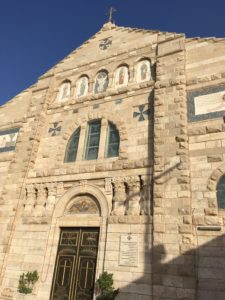
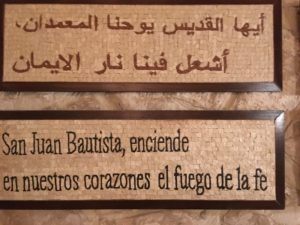
We celebrate in this church, the Shrine of the Beheading of St. John of the Baptist; after our Blessed Mother, Saint John the Baptist was the greatest saint. Jesus himself acknowledged that. He not only baptized Jesus, but he was also the first one to enter into Jesus’s baptism, as in this gospel.
Two of the most passionate apostles, Saint John and Saint James, the Sons of Zebedee, were known as the Sons of Thunder and as great apostles. Yet they too had to undergo a conversion process. They weren’t born saints. They too had to mature in what it means to be a faithful friend of the Lord.
They approach Jesus and ask a question that sounds egotistical. They start with ‘Teacher,’ and not ‘Lord,’ which shows an earlier state of spiritual growth. They haven’t fully surrendered themselves and acknowledged Christ as Lord. They haven’t given their lives to Him. He’s still just a teacher. What do they ask? We want you to us give what we want from you. Give me! Give me! Give me!
This is not the attitude we’re called to foster. Our disposition, in order for us to draw new life, new spiritual life out of our spiritual pilgrimage is to recognize that it is Jesus who says to us, ‘Give me, give me, give me… of you, your heart, your trust, your hope, your life.’ And we must come to give ourselves more, and more, and more to this living encounter with Him, and through Him, and in Him.
This is the pilgrimage we are seeking to foster, this living exchange with Jesus of our heart for His heart for ours, that we may know him as our Beloved. “My Beloved is mine and I am my Beloved’s,” says the Song of Songs.
Jesus acknowledged St. John the Baptist as the greatest among the saints, but where do we see his greatness most? In John 3:30 in which St. John the Baptist says, “I must decrease, that He might increase.” This means – to learn how give our lives in order to receive new life; to know how to empty ourselves, in order to be filled with Himself.
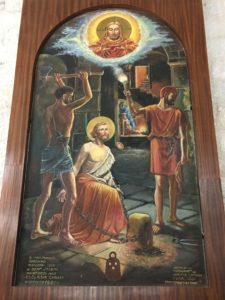
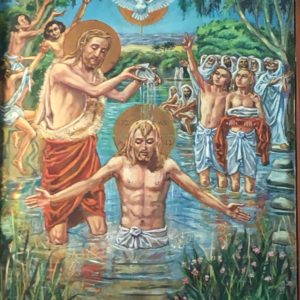
This is the purpose of humility. It’s not becoming a doormat, not taking on a martyr complex or a victim complex. It’s meant to be liberating. It’s meant to lead to a fuller sense of self as God’s child and friend. That’s the fruit of true humility.
Another fruit of true humility that leads to this greatness that God wants for us, this greatness of living in Him, with Him and through Him – as St. Therese says, this humility – bears the fruit of great confidence in God. This is what Jesus wants from us. God delights to see His children full of joyful confidence; it charms and brings joy to the heart of God when he sees us full of this audacious trust.
In Hebrews, Chapter 4, it says, “Let us confidently approach the throne of grace to receive mercy in need, in time of help.” God wants us to receive His grace and mercy. And as our Lord taught Saint Faustina, in the measure that we trust, have a living hope, in the measure that we are confident with this trust and that our heart is open to a resurrection faith, in that measure can we receive. We receive in the measure that we believe and hope.
And God wants us to receive a lot of who He is because there’s no greatness without Him. Left to ourselves, whatever greatness we might imagine is passing away. We’re only great in the measure that we are united to God in love. God’s love in us is our strength. That’s what lasts forever, the greatness of God.
He wants us to be confident to draw from Him and assures us that in having this humility to recognize that I cannot be great by my own will, by my own strength, my own ideas, my own gifts, my own plans. That’s not going to bring greatness. Surrendering my will to His will brings greatness. Bringing my weakness to His mercy will bring greatness.
We have such a Great High Priest who knows how to sympathize with our weakness. He uses His authority as Good Shepherd by coming to us at our level. He engages in our weakness. He knows our weakness from within our skin. He Himself knows what it’s like to be tested, crushed, and afflicted.
The Passion of Christ was prophesied in Isaiah “that the Lord was pleased to crush Him in infirmity because he gives his life as an offering for sin that the will of the Lord to save us may be accomplished through Him.” Through His suffering, says the Lord God of Hosts, my servant will justify many.
And Jesus knows the daily responsibilities of your life. For those of you who are married, Jesus knows your battles to be faithful to your spouse, to be faithful to your children. And if you’re not married, He knows your battle to be faithful to the Church in a secular world. He knows your battle to be faithful to whatever other obligations or responsibilities you might have. And he sympathizes in everything that you have to go through.
Christ in His Passion is the full expression of divine empathy. God empathizes with the process of everything that we have to go through that grows you. As we enter into the sacrifice of our Great High Priest who gave His life for us, may we give our lives to Him, and for Him, to others, and find our greatness in God alone – in giving ourselves us gift to others as He has given Himself as gift to us. In this process, we come to the throne of grace, the cross, with confidence, to draw mercy from the heart of Jesus and to find grace for every detail and need that we present before Him.
Unlike the apostles, we don’t say, “Teacher, we want you to do for us whatever we ask of you.” We don’t come with that kind of confidence. Instead, ask God for His kingdon to come in a particular situation in the way He knows best and our soul waits for the Lord.
We wait with hopeful expectation that God will come in the way He knows best. With peace, we let go, we let God, and we thank Him in advance.

at the Monastery of St. Charbel, Annaya, Lebanon
How blessed we are to be in the presence of one of Jesus’s very close friends. The life of St. Charbel is enigmatic, so unusual, and contradicts our expectations of saints like Padre Pio, whose holiness was obvious to many. But Saint Charbel lived a hidden life of union with God; he lived only the essentials of what it means to be a child of God.
In his Letter to the Ephesians, St. Paul says that we are called to be and destined to be a child of God and to be his intimate true friend. He writes, “In love, he destined us for adoption to himself through Jesus Christ, in accord with the favor of his will, for the praise of the glory of his grace that he granted us in the beloved.”
That is our destiny. People often wonder what God’s will is for their life. In one word God’s purpose for our life – is Love. Be open to what God has to present to you at each moment. We don’t have to look for anything else. Loving in a hidden way is sufficient.
Saint Paul continues the we were chosen “so that we may exist for the praise of His glory.” We’re called to worship the Blessed Trinity. Whatever our state of life is, our primary purpose is that we do everything for the praise of His glory.

In the Gospel of Luke, Jesus tells us that ‘not one sparrow has escaped the notice of God.’ No act of love and true humility escapes God’s notice. Be aware that the divine presence is in your heart. We must find Him there. Seek first the praise of His glory and His face in your own life.
In our pursuit of the kingdom of God, Jesus warns us to “Beware of the leaven – the hypocrisy – of the Pharisees. He warns us not be fake friends and the model that juxtaposes against those who are his real friends are the Pharisees and their hypocrisy.
Jesus also tells His disciples, “There is nothing concealed that will not be revealed nor secret that will not be known.” There is nothing hidden. We can’t live a double life, putting on a good life on the outside only. Jesus calls us to an authenticity of love, which first comes from our personal recognition that ‘I can’t do it on my own.’
Without God’s grace, none of us can fully live up to the perfect love we are called to, or allow His indwelling spirit to live in us. Grace and complete humility is what makes St. Charbel’s life so fruitful.
The hidden union he had in his heart was life- giving after he passed from this world. In this life, though the secret intimacy he shared with Jesus went unnoticed, when he went to heaven, he became a fountain of miracles for God.
St. John of the Cross writes that in the spiritual marriage, a totally flourishing friendship with God comes alive, and God chooses each of us to fully share in this intimacy.
When we kneel before Saint Charbel, we praise and glorify God for what He has done in St. Charbel. God can accomplish far more than we can imagine, provided that we allow him. We are all called to share in the fullness of his divinity. St. Charbel is that witness to our day and age. He models the spiritual marriage here and now, giving us the confidence that Jesus is capable of doing today what He did in the ancient days.
One of the main reasons it is appropriate to begin a pilgrimage by honoring Saint Charbel, is to help us to prepare our encounter in Jesus’s footsteps. By his very witness and presence, Saint Charbel is a bridge that unites the East and the West. He was a contemporary monk who lived the same contemplative spirit of St. Elijah in this Holy Land.
Saint Charbel calls us to discover our own roots and identity. He embodies, especially for Carmelites, the zeal for the absolute primacy of God’s love. As we come before the altar, we already share in this future glory through the Holy Spirit and the sacrament of the Mass. In the Spirit, the food of the Eucharist is a divine medicine that already gives us a foretaste of the reality that we are God’s possession.
We are all created to be possessed by God’s eternal love. In allegiance to Jesus with Saint Elizabeth of the Trinity and Saint Charbel, may all of us come to know how to live a hidden life of love for the praise of his glory.
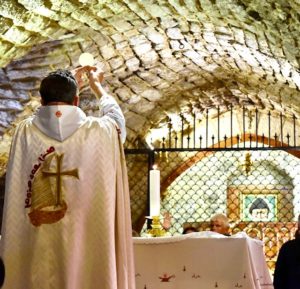
NOTE: Father Robert Elias Barcelos, OCD is currently leading a Holy Land Pilgrimage, organized by Beth Maddatu, ocds and Adriatic Tours. I have loosely transcribed his homilies so that readers can participate in the journey. – Teresa Linda, ocds